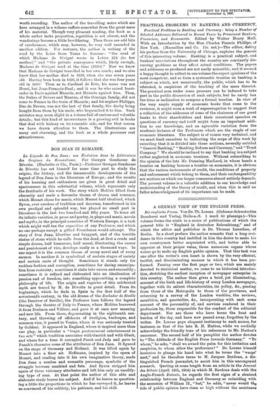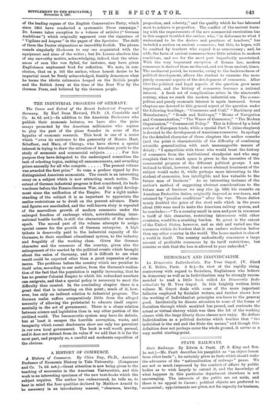A GERMAN VIEW OF THE ENGLISH PRESS.
Die englische Presse. Von Dr. Th. Lorenz. (Gebauer-Schwetschke Druckerei und Verlag, Halle-a.-S. 1 mark 50 pfennige.)—This volume forms the ninth in a series of publications of which the general title is "England in deutscher Beleuchtung," and of which the editor and publisher is Dr. Thomas Lenschau, of Berlin. In a short preface the author remarks that a long resi- dence in this country had instilled in him the desire to make his own countrymen better acquainted with, and better able to appraise at their proper value, those numerous organs whose voices go to make up English public opinion. That this task was one after the writer's own heart is shown by the very efficient, tactful, and discriminating manner in which it has been per- formed. Passing over the first page or two, which are mainly devoted to statistical matter, we come to an historical introduc- tion, sketching the earliest inception of newspaper enterprise in this country. The author then gives a brief, yet illuminating, account of the birth and life-history of every London newspaper, together with its salient characteristics, its policy, &c., passing from those of the Metropolis to those of the provinces, and returning to a survey of the London weeklies, the reviews, monthlies, and quarterlies, &b., incorporating with each some account of the personality of, and services rendered in their profession by, those responsible for the conduct of the editorial department. Nor are those who have borne the heat and burden of the day, and have now passed away, forgotten by the writer. Dr. Lorenz pays eloquent testimony to such names, for instance, as that of the late R. H. Hutton, while we cordially acknowledge the friendly tone of his references to Mr. Hutton's successor. The second half of his pamphlet the author devotes to "The Attitude of the English Press towards Germany." "To whom," he asks, "shall we award the palm for this irritation and suspicion, to whom allow the preference ? " Dr. Lorenz himself hesitates to plunge his hand into what he terms the "wasps' nest," and he therefore turns to M. Jacques Bardoux, a dis- tinguished French journalist, to assist him in this uncongenial research. Quoting at some length from an article in the Journal des _Mats (April 13th, 1904) in which M. Bardoux deals with the Anglo-French Entente, he regards the first signs of a strained, relationship between England and Germany, as coinciding with the accession of William II., "but," he adds, "never would th4 tide of public opinion have risen so high without the assistance
of the leading organs of the English Conservative Party, which since 1901 have conducted a systematic Press campaign." Dr. Lorenz takes exception to a volume of articles (" German Ambitions ") which originally appeared over the signature of " Vigilans sed Aequus" in the pages of the Spectator. The drift of these the Doctor stigmatises as incredibly foolish. The phrase sounds singularly ill-chosen to any one acquainted with the equipment and aims of the writer ; but Dr. Lorenz absolves him of any unworthy motive, acknowledging, indeed, that the utter- ances of men like von Sybel, for instance, may have given Englishmen unpleasant food for reflection. We note, in con- clusion, that on p. 101 the author, whose honest desire to be impartial must be freely acknowledged, frankly denounces what he terms the idiotic calumnies heaped on the British people and the British Army at the time of the Boer War by the German Press, and believed by the German people.































































 Previous page
Previous page